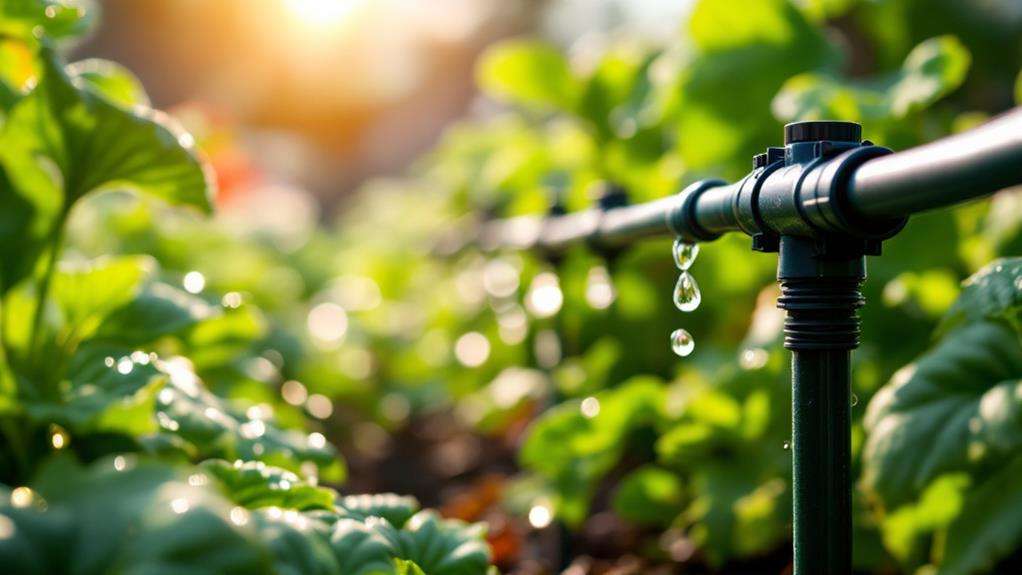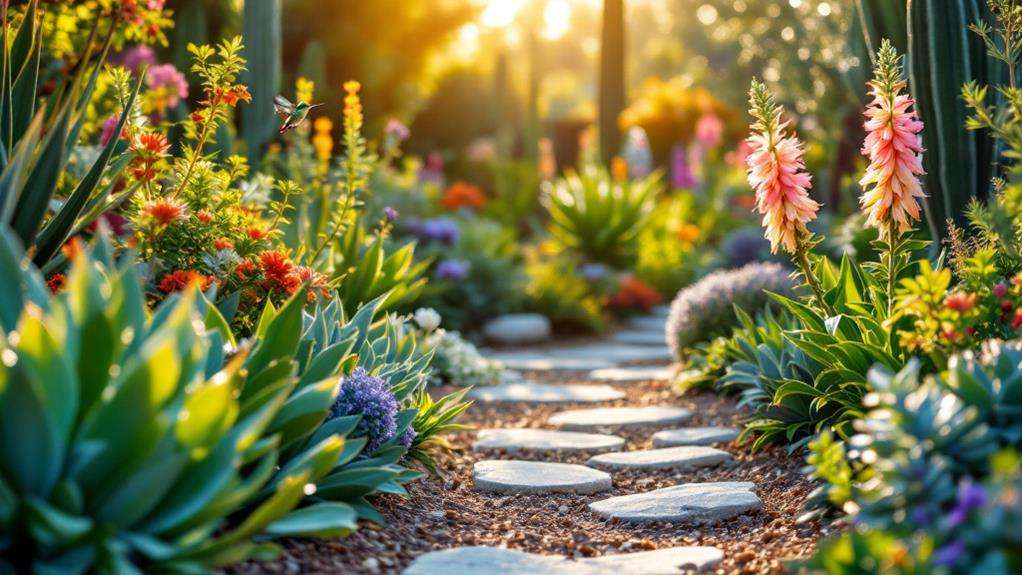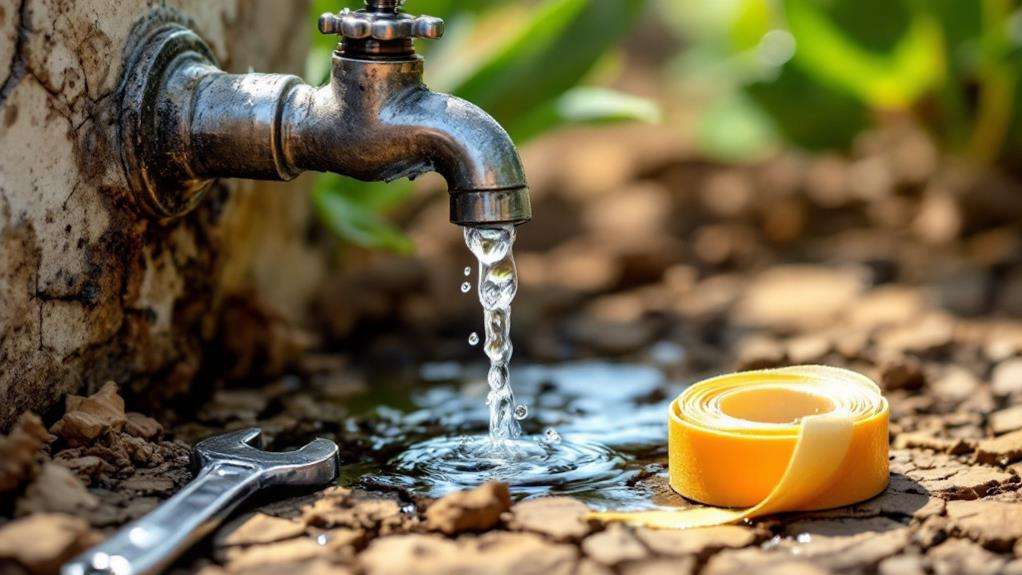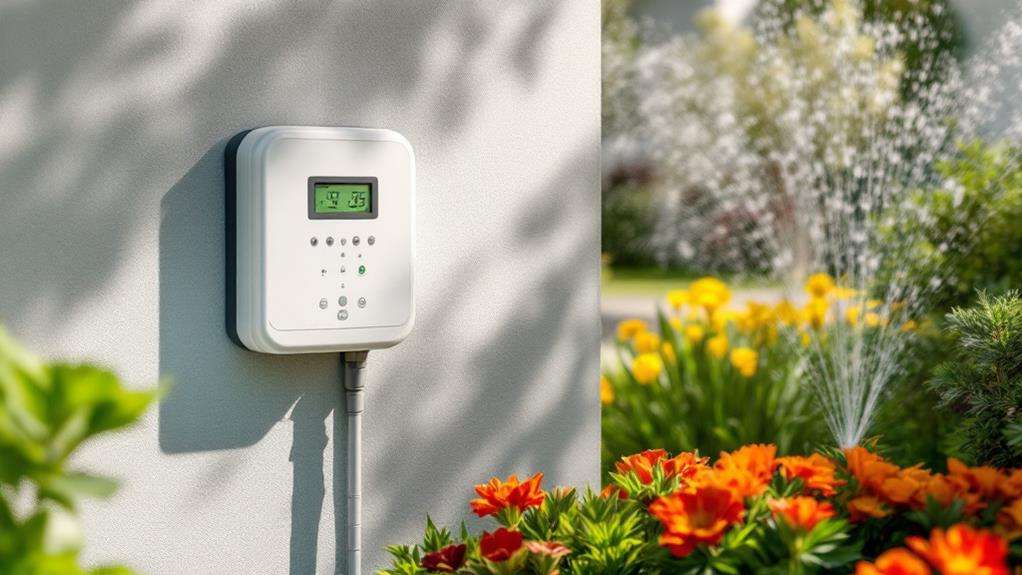Water Conservation Tips for Outdoor Plumbing Systems
To conserve water outdoors, start by optimizing your sprinkler placement and scheduling watering times wisely. Install drip irrigation systems for targeted watering and use mulch to retain soil moisture. Choose drought-tolerant plants and group them based on water needs. Collect and reuse rainwater for non-potable purposes. Fix leaks promptly and adjust sprinkler heads regularly to prevent waste. Implement smart irrigation controllers to automatically adjust watering based on weather conditions. Maintain your irrigation system through regular inspections and repairs. By following these tips, you'll substantially reduce your outdoor water consumption and lower utility bills. Explore further to uncover even more ways to save water and money.
Optimize Sprinkler Placement
Several key strategies can help you optimize your sprinkler placement for maximum water conservation. First, guarantee your sprinklers are positioned to water only the lawn and garden areas, avoiding streets and sidewalks. This simple adjustment can drastically reduce water waste and improve your outdoor water efficiency.
To further optimize your irrigation system, consider the specific needs of your plants. Group those with similar watering requirements together, creating efficient watering zones. This approach allows you to tailor your sprinkler settings to each zone, ensuring plants receive the right amount of water without overwatering others.
Timing is vital when it comes to outdoor water conservation. Avoid watering during the hottest parts of the day to minimize evaporation losses. Instead, schedule your sprinklers to run in the early morning or late evening when temperatures are cooler.
Regularly inspect your irrigation system for leaks, broken lines, or blockages. These issues can lead to significant water waste if left unchecked. By maintaining your system, you'll ensure it operates at peak efficiency, providing water precisely where your plants need it most.
Schedule Smart Watering Times
Timing your watering schedule intelligently is a key component of effective outdoor water conservation. You'll want to water early in the morning or late at night to minimize water loss through evaporation. This practice is especially vital during the summer months when temperatures soar and plants require more hydration.
To optimize your watering routine, adjust your schedule based on seasonal changes and current weather conditions. Don't water each day automatically; instead, use a soil moisture sensor to determine when your plants actually need water. This approach prevents overwatering and helps you maintain healthier plants while conserving water.
Avoid watering during the hottest parts of the day, as this leads to significant water waste through evaporation. Group plants with similar water requirements together to create efficient irrigation zones. This strategy allows you to tailor your watering schedule to specific plant needs, reducing overall water consumption.
Install Drip Irrigation Systems

To greatly reduce water waste and enhance efficiency in your outdoor plumbing system, consider installing a drip irrigation system. This water-efficient method delivers water slowly and directly to plant roots, minimizing evaporation and runoff. By implementing drip irrigation, you can save up to 60% of the water typically used by traditional sprinkler systems, making it an excellent choice for water conservation efforts.
Drip irrigation systems are highly precise, providing each plant with the exact amount of water it needs. This targeted approach not only conserves water but also promotes healthier plant growth. You can use drip irrigation for various outdoor applications, including landscaping, gardens, and potted plants.
When you install a drip irrigation system, you're optimizing your outdoor water use and taking a significant step towards sustainable gardening practices. The system's ability to deliver water directly to plant roots ensures that every drop counts, reducing waste and improving overall efficiency. By making this switch, you're not only saving water but also creating a more environmentally friendly outdoor space. Consider consulting with a professional to design and install a drip irrigation system customized to your specific needs and site requirements.
Use Mulch Effectively
Mulching is a simple yet powerful technique for conserving water in your outdoor plumbing system. By applying 2-4 inches of organic mulch around your plants, you can drastically reduce water consumption and suppress weed growth. This water-saving tip can cut your outdoor water usage by up to 30% compared to bare soil, potentially saving hundreds of gallons of water each year.
To use mulch effectively, choose materials like wood chips, leaves, or straw. These organic options not only retain soil moisture but also improve the overall health of your garden. As the mulch reduces evaporation, it allows water to soak deeper into the soil, promoting stronger root growth and reducing the amount of water needed for irrigation.
Remember to replenish your mulch layers annually to maintain a prime moisture-retaining environment. This practice not only conserves water but also saves energy by reducing the need for frequent watering. By implementing mulching in your outdoor plumbing system, you're taking a crucial step towards water and energy conservation. It's a cost-effective solution that benefits both your plants and the environment, making it an essential part of any water-conscious gardening strategy.
Choose Drought-Tolerant Plants

Sustainability in the scenic vista begins with selecting the right plants for your environment. By choosing drought-tolerant plants, you'll drastically reduce your outdoor water usage while maintaining an attractive yard. These hardy species require much less water than traditional landscaping options, making them ideal for water conservation efforts.
Consider incorporating native and adapted plants into your garden. They're well-suited to your local climate and often need minimal irrigation once established. You'll find that replacing thirsty grass with low-water-use plants and groundcover can save thousands of gallons of water annually.
To maximize efficiency, group plants with similar watering needs into distinct zones. This strategy allows for more targeted irrigation, ensuring each plant receives the appropriate amount of water without waste. By implementing these water-efficient models in your outdoor design, you'll create a beautiful outdoor space that's both environmentally friendly and cost-effective.
Collect and Reuse Rainwater
Nature's gift of rainwater provides an excellent opportunity for homeowners to conserve water and reduce their environmental impact. By installing a rainwater harvesting system, you'll be able to collect and store this free, renewable resource for later use. A rainwater tank can save you thousands of gallons of water annually, considerably cutting your reliance on municipal water supplies and lowering your utility bills.
You can use the collected rainwater for various outdoor purposes, such as watering your garden, filling ponds, or washing your car. Rainwater is generally cleaner than groundwater, making it ideal for these applications. By utilizing rainwater for non-potable uses, you'll conserve treated water for essential indoor needs.
Implementing a rainwater collection system not only benefits you but also helps your community and the environment. It reduces stormwater runoff, easing the strain on local drainage systems and minimizing erosion. You'll be contributing to water conservation efforts while enjoying the advantages of a sustainable water source. Consider installing a rainwater harvesting system to make the most of this precious resource and take a noteworthy step towards a more eco-friendly lifestyle.
Fix Leaks Promptly

While collecting rainwater is an excellent way to conserve water, it's equally important to prevent water loss from your existing outdoor plumbing systems. Fixing leaks promptly is a pivotal tip for maintaining an efficient outdoor plumbing system and conserving water.
You can save thousands of gallons annually by quickly addressing leaks in your sprinkler lines, faucets, and hose bibs. Regularly inspect your outdoor plumbing for drips, cracks, or other issues, and don't hesitate to repair them. Ignoring leaks in irrigation systems or water features can lead to significant water waste over time.
Keep an eye on your water usage and bills for unexpected spikes, as these can indicate hidden leaks in your outdoor plumbing system. For a thorough approach, consider hiring a professional plumber to perform a comprehensive inspection and maintenance of your outdoor plumbing. This proactive step can help detect and fix leaks before they cause excessive water waste.
Adjust Sprinkler Heads Regularly
Regularly adjusting your sprinkler heads is crucial for efficient outdoor water use. By taking the time to adjust sprinkler heads regularly, you'll guarantee optimal coverage and prevent water waste. This simple task can considerably impact your water conservation efforts and maintain a healthy landscape.
Start by inspecting your sprinkler heads for any blockages or damage that might affect water distribution. Clear any debris and replace damaged parts to allow water to flow freely. Next, observe the spray pattern and adjust the heads to water only your lawn and garden, not streets or sidewalks. This prevents unnecessary water waste and keeps your landscaping properly hydrated.
Pay attention to specific areas that may be receiving too much or too little water. Adjust the sprinkler heads accordingly to provide even coverage across your landscape. Consider periodically moving sprinklers to different locations to ensure all areas receive adequate water.
When selecting new sprinklers, opt for models with large water droplets and low-angle spray. These features reduce evaporation and allow water to reach its intended target more effectively. By implementing these practices, you'll conserve water, save money, and maintain a thriving outdoor space.
Implement Smart Irrigation Controllers

To maximize water efficiency in your outdoor plumbing system, implementing smart irrigation controllers is a watershed moment. These advanced devices can reduce your outdoor water consumption by up to 30%, making them an essential water-saving solution for eco-conscious homeowners. Smart irrigation controllers use local weather data and soil moisture sensors to optimize watering schedules, ensuring your plants receive just the right amount of hydration.
Weather-based controllers are particularly effective, as they:
- Automatically adjust watering schedules based on real-time weather conditions
- Prevent overwatering during rainy periods, saving water and protecting plant health
- Allow for customized programming of different scenic areas to meet specific needs
By incorporating soil moisture sensors, you'll further enhance your system's efficiency. These sensors halt irrigation when the soil is adequately saturated, preventing unnecessary watering and promoting healthier root systems.
Don't let the initial cost deter you from upgrading your irrigation system. Many local water utilities offer rebates and incentives for installing smart irrigation controllers, making them a cost-effective choice in the long run. You'll not only conserve water but also save money on your utility bills while maintaining a lush, flourishing area.
Maintain Your Irrigation System
Maintaining your irrigation system is indispensable for maximizing water conservation efforts and ensuring your outdoor plumbing operates at peak efficiency. Regular inspections are essential to identify and address issues like leaks, broken lines, or blockages that can lead to water waste. By conducting these checks, you'll keep your system running smoothly and prevent unnecessary water leakage.
Don't overlook the importance of cleaning and adjusting your sprinkler heads. This simple task ensures proper coverage and prevents water from being wasted on non-target areas. Routine maintenance of all irrigation system components is paramount for optimal performance. Consider scheduling professional maintenance services if you're unsure about performing these tasks yourself.
To further enhance your water conservation efforts, upgrade to smart irrigation controllers. These devices automatically adjust watering schedules based on weather conditions and plant needs, reducing water waste and improving overall efficiency. Check with your local water provider for potential rebates and incentives that can offset the cost of system upgrades and maintenance. By investing time and resources into maintaining your irrigation system, you'll not only conserve water but also save money on your water bills in the long run.
